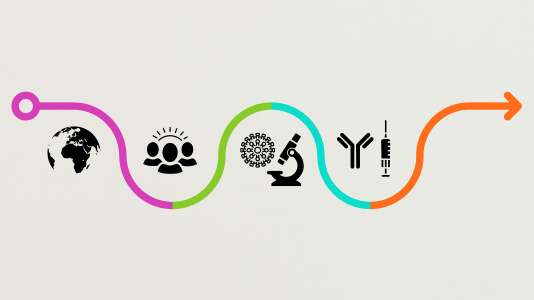August 2, 2023
Discovery of gene limiting replication of HIV published in Nature
New study of nearly 4,000 people of African ancestries led to identification of gene inhibiting HIV replication.
IAVI is pleased to announce the release of a new analysis identifying a gene thought to inhibit the replication of HIV. This finding, derived from an analysis of 4,000 people of African descent, marks a distinct and exciting step toward a more robust understanding of HIV progression in people of diverse ancestries.

Study authors derived these findings from genome-wide association studies (GWAS) of nearly 4,000 people of African descent living with HIV. GWAS are analyses of entire genomes to identify specific genes influencing clinical outcomes, such as the progression of disease. A portion of the samples used in these analyses were from IAVI’s Protocol C, a long-term epidemiological study of HIV. Protocol C tracked study participants with incident HIV infection from East and Southern Africa from 2006 to 2011, collecting 190,000 samples, 26,000 of which have been shared with researchers globally. All study participants were provided with or referred for routine HIV care.
The study authors specifically assessed the genetic determinants of control of setpoint viral load, a measure of the speed of HIV replication and transmissibility. The study authors identified a new genetic modifier of HIV progression on Chromosome 1, present in some people of African ancestries. The top associated variant, CHD1L, recognized by researchers in this analysis, is a protein involved in DNA repair. Study authors identified a variation of the CHD1L gene linked to the spontaneous control of HIV-1, and further demonstrated that the variation on CHD1L is engaged in white blood cell repair.
This remarkable finding may assist in the development of novel therapeutic drugs. It also demonstrates the importance of advancing genomic research focused on people of African descent, who are deeply under-studied when compared to European populations. With people of African ancestries experiencing the highest burden of HIV/AIDS globally, studies of these populations offer both the greatest promise for genomic discovery that can lead to new therapeutic options and serve to advance global health equity.
The study was co-led by École Polytechnique Fédérale de Lausanne School of Life Sciences, Public Health Agency of Canada’s National Microbiology Laboratory, and Imperial College London. IAVI’s Matt Price, Ph.D., director of epidemiology, is co-author. A full list of co-authoring institutions is below. Generous funding for this study and for IAVI’s Protocol C is made possible by the support of the American People through the U.S. President’s Emergency Plan for AIDS Relief (PEPFAR) through United States Agency for International Development (USAID). The contents of this article are the sole responsibility of IAVI and do not necessarily reflect the views of PEPFAR, USAID, or the United States Government.
Read more about IAVI’s Protocol C.
List of contributors
- École Polytechnique Fédérale de Lausanne School of Life Sciences
- Public Health Agency of Canada
- University of Manitoba
- Wellcome Sanger Institute
- University of Cambridge
- King’s College London
- Lausanne University Hospital (CHUV) and University of Lausanne
- Swiss Institute of Bioinformatics
- The Jackson Laboratory for Genomic Medicine
- Stanford University
- Northwestern University
- Ragon Institute of MGH, MIT and Harvard
- Frederick National Laboratory for Cancer Research
- San Francisco Department of Public Health
- University of Modena and Reggio Emilia
- Siena University Hospital
- University of Siena
- National Institutes of Health
- Columbia University
- Vanderbilt University School of Medicine
- University of Washington
- London School of Hygiene and Tropical Medicine
- Uganda Virus Research Institute & London School of Hygiene and Tropical Medicine
- Zambia Emory HIV Research Project
- Johns Hopkins University
- University of Amsterdam
- RTI International
- Université Paris Saclay
- Bicêtre Hospital
- Murdoch University and Pathwest
- IrsiCaixa AIDS Research Institute
- University of Vic – Central University of Catalonia
- CIBERINFEC, Instituto de Salud Carlos III
- University of Barcelona
- National Health Laboratory Service, South Africa and University of KwaZulu-Natal
- Copenhagen University Hospital
- San Raffaele Scientific Institute
- Vita-Salute San Raffaele University, School of Medicine Milan
- IAVI
- University of California, San Francisco
- Inselspital – University Hospital Bern
- Hôpital Saint-Louis AP-HP
- University of Zurich
- Howard Hughes Medical Institute
- Frederick National Laboratory
- Conservatoire national des arts et métiers
- National University of Singapore
- Queen Mary University of London
- Imperial College London
- Omnigen Biodata
Funding
- École Polytechnique Fédérale de Lausanne School of Life Sciences
- Swiss HIV Cohort Study Research Foundation
- Swiss National Science Foundation
- Medical Research Council, U.K.
- National Institute for Health Research, U.K.
- Cambridge Clinical Academic Reserve
- Wellcome Sanger Institute
- National Institutes of Health
- Italian Ministry of University and Research
- Italian Ministry of Health
- Institut d’Investigacions Biomèdiques August Pi I Sunyer (IDIBAPS)